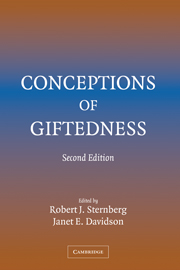Book contents
- Frontmatter
- Contents
- Preface
- List of Contributors
- 1 Gifted Education Without Gifted Children: The Case for No Conception of Giftedness
- 2 Youths Who Reason Exceptionally Well Mathematically and/or Verbally: Using the MVT:D4 Model to Develop Their Talents
- 3 A Child-Responsive Model of Giftedness
- 4 School-Based Conception of Giftedness
- 5 Giftedness, Talent, Expertise, and Creative Achievement
- 6 Permission to Be Gifted: How Conceptions of Giftedness Can Change Lives
- 7 From Gifts to Talents: The DMGT as a Developmental Model
- 8 Nurturing Talent in Gifted Students of Color
- 9 The Munich Model of Giftedness Designed to Identify and Promote Gifted Students
- 10 Systemic Approaches to Giftedness: Contributions of Russian Psychology
- 11 Giftedness and Gifted Education
- 12 The Importance of Contexts in Theories of Giftedness: Learning to Embrace the Messy Joys of Subjectivity
- 13 Feminist Perspectives on Talent Development: A Research-Based Conception of Giftedness in Women
- 14 The Three-Ring Conception of Giftedness: A Developmental Model for Promoting Creative Productivity
- 15 In Defense of a Psychometric Approach to the Definition of Academic Giftedness: A Conservative View from a Die-Hard Liberal
- 16 Creative Giftedness
- 17 Genetics of Giftedness: The Implications of an Emergenic–Epigenetic Model
- 18 The WICS Model of Giftedness
- 19 Beyond Expertise: Conceptions of Giftedness as Great Performance
- 20 Domain-Specific Giftedness: Applications in School and Life
- 21 Extreme Giftedness
- 22 Making Giftedness Productive
- 23 The Actiotope Model of Giftedness
- 24 The Scientific Study of Giftedness
- Author Index
- Subject Index
22 - Making Giftedness Productive
- Frontmatter
- Contents
- Preface
- List of Contributors
- 1 Gifted Education Without Gifted Children: The Case for No Conception of Giftedness
- 2 Youths Who Reason Exceptionally Well Mathematically and/or Verbally: Using the MVT:D4 Model to Develop Their Talents
- 3 A Child-Responsive Model of Giftedness
- 4 School-Based Conception of Giftedness
- 5 Giftedness, Talent, Expertise, and Creative Achievement
- 6 Permission to Be Gifted: How Conceptions of Giftedness Can Change Lives
- 7 From Gifts to Talents: The DMGT as a Developmental Model
- 8 Nurturing Talent in Gifted Students of Color
- 9 The Munich Model of Giftedness Designed to Identify and Promote Gifted Students
- 10 Systemic Approaches to Giftedness: Contributions of Russian Psychology
- 11 Giftedness and Gifted Education
- 12 The Importance of Contexts in Theories of Giftedness: Learning to Embrace the Messy Joys of Subjectivity
- 13 Feminist Perspectives on Talent Development: A Research-Based Conception of Giftedness in Women
- 14 The Three-Ring Conception of Giftedness: A Developmental Model for Promoting Creative Productivity
- 15 In Defense of a Psychometric Approach to the Definition of Academic Giftedness: A Conservative View from a Die-Hard Liberal
- 16 Creative Giftedness
- 17 Genetics of Giftedness: The Implications of an Emergenic–Epigenetic Model
- 18 The WICS Model of Giftedness
- 19 Beyond Expertise: Conceptions of Giftedness as Great Performance
- 20 Domain-Specific Giftedness: Applications in School and Life
- 21 Extreme Giftedness
- 22 Making Giftedness Productive
- 23 The Actiotope Model of Giftedness
- 24 The Scientific Study of Giftedness
- Author Index
- Subject Index
Summary
What may best distinguish our approach from that of others is its emphasis on accomplishment in the case of children and youth, and eminence in the case of adults. For us, accomplishment rather than potential is the best indication of giftedness. Giftedness is only one of several factors that may affect how much a person attains over the course of childhood, youth, or a lifetime. For example, without large amounts of intensive practice, parental support, and expert instruction, giftedness rarely comes to full fruition.
Though fundamentally psychological and educational, our approach is derivative of the “new economics” that broadly applies well-established economic principles to explain human behavior outside its traditional monetary purview, including learning, human and social capital, marriage, divorce, crime, addictions, suicide, and other phenomena (Becker, 1976). This economic approach employs only a few central ideas to parsimoniously explain and predict a wide variety of human behavior.
Provocative and productive, new applications of economics echo the original Greek meaning of the term – the management of household affairs. Though founded in agreed-on theory, the economic principles accord well with common sense and have many practical applications. For example, dealing with scarcity – not just of money, but of time, energy, and attention – is a classic problem not only of economics but of human life. Economists also influence policy makers because they explicitly quantify the benefits, costs, and risks that should weigh heavily in rational decision making.
Can economic ideas help us think more clearly about making giftedness fruitful or, in the language of economics, “productive”? The “opportunity costs” of notable accomplishment or eminence in violin playing preclude top ballet performance and world-class chess.
Information
- Type
- Chapter
- Information
- Conceptions of Giftedness , pp. 395 - 410Publisher: Cambridge University PressPrint publication year: 2005
Accessibility standard: Unknown
Why this information is here
This section outlines the accessibility features of this content - including support for screen readers, full keyboard navigation and high-contrast display options. This may not be relevant for you.Accessibility Information
- 10
- Cited by
